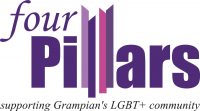EXERCISE
Healthy living is important to us all, Four Pillars is proud to present Rainbow Rookies, a collective group that helps members experience several activities. Please visit our groups page for more information and to sign-up for free. We also promote independent groups such as Taexali Rugby Club and Aberdeen Front Runners, these clubs are vital to our community to not only improve your health and well-being but generate a sense of community, belonging and family.
“Aberdeen FrontRunners has a simple aim – to get you out running. Gender and sexuality should be left at home because this group is open to everyone who shares the same love of running that we do. All we ask in return is a mutual respect for those you are running with. We have strong links with the LGBT community and promote inclusiveness in sport.”
Click below to visit their pages
“Aberdeen Taexali Rugby Club is an inclusive rugby club based in the North East of Scotland, and is one of four inclusive rugby teams in Scotland (Caledonian Thebans in Edinburgh, Dunfermline Knights in Dunfermline and Glasgow Alphas in Glasgow.
Our mission is to help break down some barriers that exist for some people who ordinarily might not get involved in rugby for whatever that reason might be, whether that be sexual orientation, race, gender, age or experience. We want to provide a safe, inclusive and active space in the sport of rugby union.
Whilst our players are predominantly LGBT+ we also have straight players who are just as much part of the team. Sexual orientation is not a barrier – we welcome anyone regardless of how they might identify”
Click below to visit their pages
GENDER DYSPHORIA
The NHS says that Gender dysphoria is a term that describes a sense of unease that a person may have because of a mismatch between their biological sex and their gender identity. This sense of unease or dissatisfaction may be so intense it can lead to depression and anxiety and have a harmful impact on daily life.
Gender identity refers to our sense of who we are and how we see and describe ourselves. Most people identify as “male” or “female”. These are sometimes called “binary” identities. But some people feel their gender identity is different from their biological sex. For example, some people may have male genitals and facial hair but do not identify as a male or feel masculine. Some may have female genitals and breasts but do not identify as a female or feel feminine.
Some people do not define themselves as having a “binary” identity. For them the concept of gender is not relevant to their identity.
They may use different terms, such as agender, gender diverse, gender non-conforming, to describe their identity. However, as a group, they are often called “non-binary”.
Many people with gender dysphoria have a strong, lasting desire to live a life that “matches” or expresses their gender identity. They do this by changing the way they look and behave. Some people with gender dysphoria, but not all, may want to use hormones and sometimes surgery to express their gender identity. Gender dysphoria is not a mental illness, but some people may develop mental health problems because of gender dysphoria.
People with gender dysphoria may have changed their appearance, their behaviour or their interests.
They may also show signs of discomfort or distress, including:
-low self-esteem
-becoming withdrawn or socially isolated
-depression or anxiety
-taking unnecessary risks
-neglecting themselves
Here at Four Pillars we offer Grampian T-Folk which is a peer social group for the transgender community. The Group meets monthly and offer opportunities such as tea & coffees, building relationships, educational activities, best practice advice and professional visits to the group in the form of voice coaching, NHS staff and more
We also offer one-to-one support for those that need, simply contact us for more information.
For more information from the NHS click here
BODY DYSPHORIC DISORDER
You might have BDD if you:
-worry a lot about a specific area of your body (particularly your face)
-spend a lot of time comparing your looks with other people’s
-look at yourself in mirrors a lot or avoid mirrors altogether
-go to a lot of effort to conceal flaws – for example, by spending a long time combing your hair, applying make-up or choosing clothes
-pick at your skin to make it “smooth”
BDD can seriously affect your daily life, including your work, social life and relationships. BDD can also lead to depression, self-harm and even thoughts of suicide.
For more information from the NHS click here
